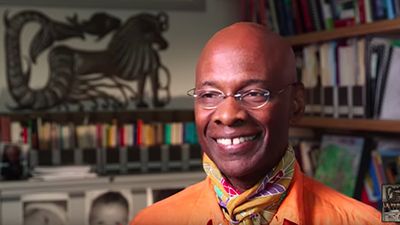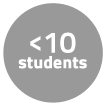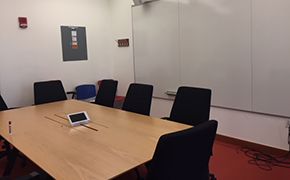Instructor Insights pages are part of the OCW Educator initiative, which seeks to enhance the value of OCW for educators.

Professor Michel DeGraff in his office on the MIT campus. (Image courtesy of MIT OpenCourseWare.)
Rich discussions are best arrived at if they stem from a personal basis where students are invested in trying to find an answer that can work for them in their personal lives, the lives of their families, or their communities.
— Michel DeGraff
In the following dual language videos and Chalk Radio podcast episode, Michel DeGraff describes various aspects of how he taught 24.908 Creole Languages and Caribbean Identities.
View in English:
- Meet the Educator
- Inspiration for the Course
- Rooted in the Personal: Students’ Questions about Identity
- Unpacking Misconceptions about Creole Languages and Identities
- Sharing with Teachers to Promote Social Change
- Oral Presentations: Connecting Abstract Analyses to Lived Experiences
- Facilitating Meaningful Classroom Discussions
- Using Student Surveys to Customize Teaching
- Real-World Learning Outcomes
View in Creole:
- Brase lide ak edikatè a (Meet the Educator)
- Ki sa ki enspire kou a (Inspiration for the Course)
- Chache konprann ki moun nou ye: Kesyon etidyan yo sou idantite (Rooted in the Personal: Students’ Questions about Identity)
- Korije vye lide sou lang kreyòl e sou fòmasyon idantite (Unpacking Misconceptions about Creole Languages & Identities)
- Pataje ak anseyan pou ankouraje chanjman sosyal tou patou (Sharing with Teachers to Promote Social Change)
- Prezantasyon oral etidyan yo: Konekte analiz abstrè ak esperyans ke yo viv (Oral Presentations: Connecting Abstract Analyses to Lived Experiences)
- Entèvyou ak pwofesè a: Fasilite brase lide ki djanm nan sal klas (Facilitating Meaningful Classroom Discussions)
- Sèvi ak sondaj pami etidyan yo pou n byen kadre ansèyman an selon pwofil etidyan yo (Using Student Surveys to Customize Teaching)
- Enpak aprantisaj la nan lavi tou lè jou etidyan yo (Real-World Learning Outcomes)
Student Insights
It’s not just about the curriculum; it’s about the space you create.
— Dalila Stanfield
In the following videos, two students share their experiences in 24.908 Creole Languages and Caribbean Identities.
José Esparza, MIT Student
Dalila Stanfield, Wellesley Student
Curriculum Information
Prerequisites
None
Requirements Satisfied
- HASS-S

- CI-H

- Unrestricted elective
Offered
Offered periodically
Assessment
Grade Breakdown
The students' grades were based on the following activities:
 15% Essay 1 15% Essay 1
 15% Essay 2 15% Essay 2 15% Essay 3 15% Essay 3 40% Essay 4 (20%) and oral presentation (20%) 40% Essay 4 (20%) and oral presentation (20%) 15% Attendance & Participation 15% Attendance & Participation |
Rubrics
A rubric (PDF) was used to assess the essay assignments.
Student Information

Breakdown by Year
Mostly juniors and seniors
Breakdown by Major
Linguistics, bio-engineering, earth science, mathematics, and materials science
Typical Student Background
Most students were from MIT; there were also visiting students from Wellesley. Many students were first generation Americans with parents or grandparents from Mauritius, India and Mexico, among other places. Students came to the course with the understanding that ideology around identities or identity politics are yet another “metaphor for power” (who belongs, who doesn’t belong).
During an average week, students were expected to spend 12 hours on the course, roughly divided as follows:
In Class
- Met 1 time per week for 3 hours per session; 14 sessions total.
- Class sessions were discussion-based. Students also made oral presentations in which they connected course readings to their lived experiences.
Out of Class
- Students wrote essays and completed readings outside of class.
Semester Breakdown
| WEEK | M | T | W | Th | F |
|---|---|---|---|---|---|
| 1 |  |
 |
 |
 |
 |
| 2 |  |
 |
 |
 |
 |
| 3 |  |
 |
 |
 |
 |
| 4 |  |
 |
 |
 |
 |
| 5 |  |
 |
 |
 |
 |
| 6 |  |
 |
 |
 |
 |
| 7 |  |
 |
 |
 |
 |
| 8 |  |
 |
 |
 |
 |
| 9 |  |
 |
 |
 |
 |
| 10 |  |
 |
 |
 |
 |
| 11 |  |
 |
 |
 |
 |
| 12 |  |
 |
 |
 |
 |
| 13 |  |
 |
 |
 |
 |
| 14 |  |
 |
 |
 |
 |
| 15 |  |
 |
 |
 |
 |
| 16 |  |
 |
 |
 |
 |
 No classes throughout MIT
No classes throughout MIT Class meeting
Class meeting Essay due
Essay due No class session scheduled
No class session scheduled Student presentations
Student presentations

 Room 1 of 1
Room 1 of 1 